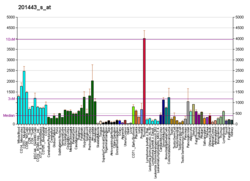| ATP6AP2 | |||||||||||||||||||||||||||||||||||||||||||||||||||
|---|---|---|---|---|---|---|---|---|---|---|---|---|---|---|---|---|---|---|---|---|---|---|---|---|---|---|---|---|---|---|---|---|---|---|---|---|---|---|---|---|---|---|---|---|---|---|---|---|---|---|---|
| |||||||||||||||||||||||||||||||||||||||||||||||||||
| Identifiers | |||||||||||||||||||||||||||||||||||||||||||||||||||
| Aliases | ATP6AP2, APT6M8-9, ATP6IP2, ATP6M8-9, ELDF10, M8-9, MRXE, MRXSH, MSTP009, PRR, RENR, XMRE, XPDS, HT028, ATPase H+ transporting accessory protein 2, CDG2R | ||||||||||||||||||||||||||||||||||||||||||||||||||
| External IDs | OMIM: 300556; MGI: 1917745; HomoloGene: 38097; GeneCards: ATP6AP2; OMA:ATP6AP2 - orthologs | ||||||||||||||||||||||||||||||||||||||||||||||||||
| |||||||||||||||||||||||||||||||||||||||||||||||||||
| |||||||||||||||||||||||||||||||||||||||||||||||||||
| |||||||||||||||||||||||||||||||||||||||||||||||||||
| |||||||||||||||||||||||||||||||||||||||||||||||||||
| |||||||||||||||||||||||||||||||||||||||||||||||||||
| Wikidata | |||||||||||||||||||||||||||||||||||||||||||||||||||
| |||||||||||||||||||||||||||||||||||||||||||||||||||
The renin receptor also known as ATPase H(+)-transporting lysosomal accessory protein 2, or the prorenin receptor, is a protein that in humans is encoded by the ATP6AP2 gene.
Function
The renin receptor binds renin and prorenin. Binding of renin to this receptor induces the conversion of angiotensinogen to angiotensin I.
This protein is associated with proton-translocating ATPases which have fundamental roles in energy conservation, secondary active transport, acidification of intracellular compartments, and cellular pH homeostasis. There are three classes of ATPases- F, P, and V. The vacuolar (V-type) ATPases have a transmembrane proton-conducting sector and an extramembrane catalytic sector. This protein has been found associated with the transmembrane sector of the V-type ATPases.
References
- ^ GRCh38: Ensembl release 89: ENSG00000182220 – Ensembl, May 2017
- ^ GRCm38: Ensembl release 89: ENSMUSG00000031007 – Ensembl, May 2017
- "Human PubMed Reference:". National Center for Biotechnology Information, U.S. National Library of Medicine.
- "Mouse PubMed Reference:". National Center for Biotechnology Information, U.S. National Library of Medicine.
- Ludwig J, Kerscher S, Brandt U, Pfeiffer K, Getlawi F, Apps DK, Schagger H (Jun 1998). "Identification and characterization of a novel 9.2-kDa membrane sector-associated protein of vacuolar proton-ATPase from chromaffin granules". J Biol Chem. 273 (18): 10939–47. doi:10.1074/jbc.273.18.10939. PMID 9556572.
- Demirci FY, White NJ, Rigatti BW, Lewis KF, Gorin MB (Oct 2001). "Identification, genomic structure, and screening of the vacuolar proton-ATPase membrane sector-associated protein M8-9 gene within the COD1 critical region (Xp11.4)". Mol Vis. 7: 234–9. PMID 11590366.
- ^ "Entrez Gene: ATP6AP2 ATPase, H+ transporting, lysosomal accessory protein 2".
- Nguyen G, Delarue F, Burcklé C, Bouzhir L, Giller T, Sraer JD (June 2002). "Pivotal role of the renin/prorenin receptor in angiotensin II production and cellular responses to renin". J. Clin. Invest. 109 (11): 1417–27. doi:10.1172/JCI14276. PMC 150992. PMID 12045255.
Further reading
- Kaneshiro Y, Ichihara A, Sakoda M, et al. (2007). "Slowly progressive, angiotensin II-independent glomerulosclerosis in human (pro)renin receptor-transgenic rats" (PDF). J. Am. Soc. Nephrol. 18 (6): 1789–95. doi:10.1681/ASN.2006091062. PMID 17494887.
- Schefe JH, Menk M, Reinemund J, et al. (2007). "A novel signal transduction cascade involving direct physical interaction of the renin/prorenin receptor with the transcription factor promyelocytic zinc finger protein". Circ. Res. 99 (12): 1355–66. CiteSeerX 10.1.1.486.8053. doi:10.1161/01.RES.0000251700.00994.0d. PMID 17082479.
- Kaneshiro Y, Ichihara A, Takemitsu T, et al. (2006). "Increased expression of cyclooxygenase-2 in the renal cortex of human prorenin receptor gene-transgenic rats". Kidney Int. 70 (4): 641–6. doi:10.1038/sj.ki.5001627. PMID 16807542.
- Burcklé CA, Jan Danser AH, Müller DN, et al. (2006). "Elevated blood pressure and heart rate in human renin receptor transgenic rats". Hypertension. 47 (3): 552–6. doi:10.1161/01.HYP.0000199912.47657.04. PMID 16401765.
- Huang Y, Wongamorntham S, Kasting J, et al. (2006). "Renin increases mesangial cell transforming growth factor-beta1 and matrix proteins through receptor-mediated, angiotensin II-independent mechanisms". Kidney Int. 69 (1): 105–13. doi:10.1038/sj.ki.5000011. PMID 16374430.
- Otsuki T, Ota T, Nishikawa T, et al. (2007). "Signal sequence and keyword trap in silico for selection of full-length human cDNAs encoding secretion or membrane proteins from oligo-capped cDNA libraries". DNA Res. 12 (2): 117–26. doi:10.1093/dnares/12.2.117. PMID 16303743.
- Ramser J, Abidi FE, Burckle CA, et al. (2005). "A unique exonic splice enhancer mutation in a family with X-linked mental retardation and epilepsy points to a novel role of the renin receptor". Hum. Mol. Genet. 14 (8): 1019–27. doi:10.1093/hmg/ddi094. PMID 15746149.
- Gerhard DS, Wagner L, Feingold EA, et al. (2004). "The status, quality, and expansion of the NIH full-length cDNA project: the Mammalian Gene Collection (MGC)". Genome Res. 14 (10B): 2121–7. doi:10.1101/gr.2596504. PMC 528928. PMID 15489334.
- Strausberg RL, Feingold EA, Grouse LH, et al. (2003). "Generation and initial analysis of more than 15,000 full-length human and mouse cDNA sequences". Proc. Natl. Acad. Sci. U.S.A. 99 (26): 16899–903. Bibcode:2002PNAS...9916899M. doi:10.1073/pnas.242603899. PMC 139241. PMID 12477932.
- Hedera P, Alvarado D, Beydoun A, Fink JK (2002). "Novel mental retardation-epilepsy syndrome linked to Xp21.1-p11.4". Ann. Neurol. 51 (1): 45–50. doi:10.1002/ana.10051. hdl:2027.42/34887. PMID 11782983. S2CID 18107509.
- Hu RM, Han ZG, Song HD, et al. (2000). "Gene expression profiling in the human hypothalamus-pituitary-adrenal axis and full-length cDNA cloning". Proc. Natl. Acad. Sci. U.S.A. 97 (17): 9543–8. Bibcode:2000PNAS...97.9543H. doi:10.1073/pnas.160270997. PMC 16901. PMID 10931946.
External links
- ATP6AP2 human gene location in the UCSC Genome Browser.
- ATP6AP2 human gene details in the UCSC Genome Browser.
This article on a gene on the human X chromosome and/or its associated protein is a stub. You can help Misplaced Pages by expanding it. |





